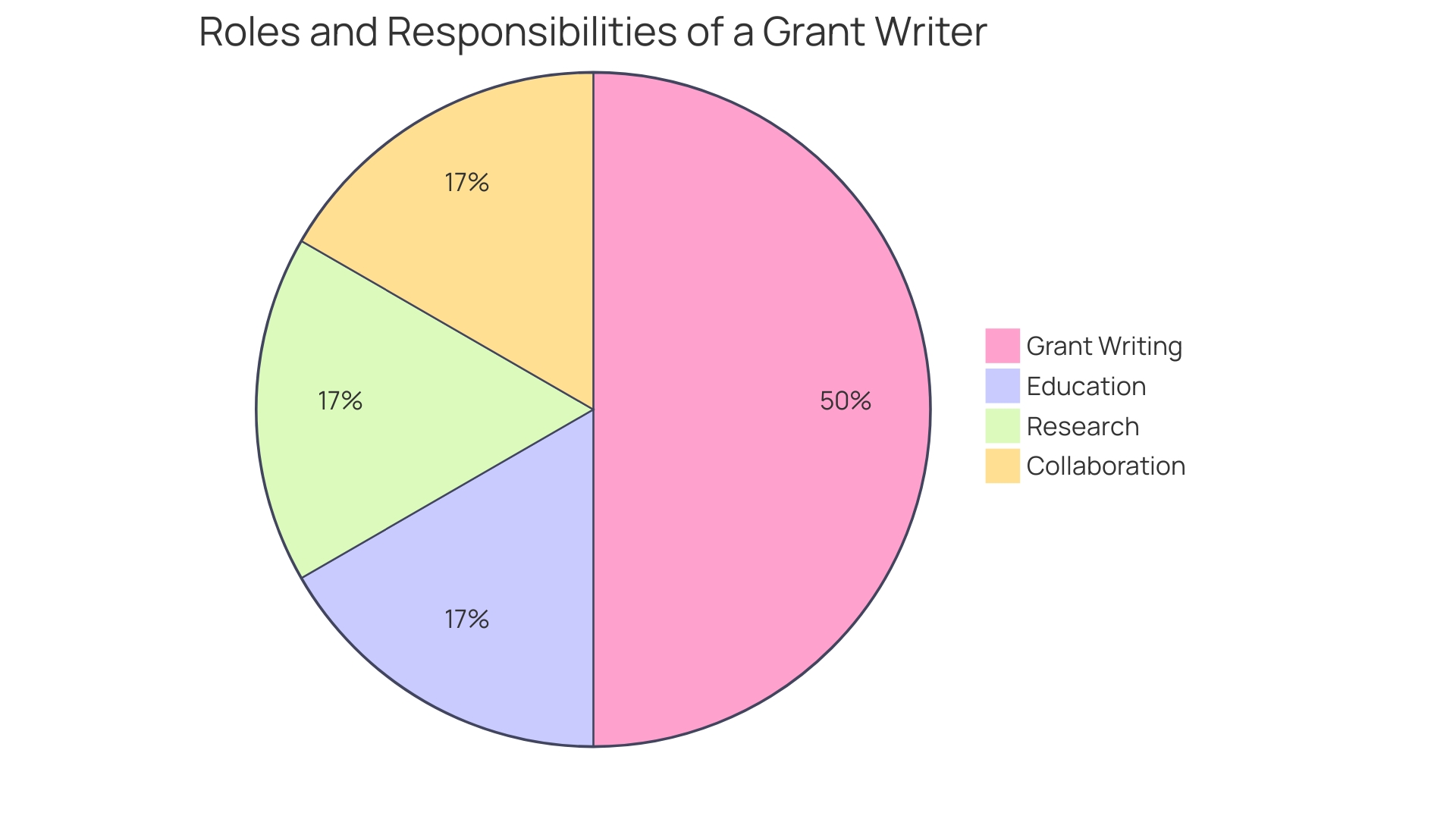Introduction
Grant writing is a meticulous process that requires a deep understanding of an organization’s history, objectives, and the impact of proposed projects. Grant writers must vividly articulate these elements to persuade funders of a project’s merit and feasibility within a set timeframe. As a writer in this vital field, it’s essential to be informed about the financial rewards of your profession.
Understanding the compensation landscape for grant writers requires a look at the broader picture of nonprofit operations. Nonprofits, defined as organizations exempt from federal income taxes, dedicate their work to a variety of causes, including charitable, religious, educational, and scientific efforts. They must maintain transparency with the IRS by filing annual reports on their finances.
Within this context, the role of a grant writer is not just about writing; it involves extensive research and relationship-building, including leveraging platforms like LinkedIn and attending relevant events to connect with funders. As you navigate your career as a grant writer, remember that your skills contribute significantly to the sustainability and success of the organizations you serve, and your compensation reflects the specialized expertise you bring to this crucial role.
Average Grant Writer Salary
Grant writing is a meticulous process that requires a deep understanding of an organization’s history, objectives, and the impact of proposed projects. Grant writers must vividly articulate these elements to persuade funders of a project’s merit and feasibility within a set timeframe. Grants, typically awarded by government agencies, corporations, or foundations, are financial gifts that don’t require repayment. They can be earmarked for specific projects, like animal welfare research, or unrestricted, benefiting operational costs such as staff salaries.
As a writer in this vital field, it’s essential to be informed about the financial rewards of your profession. While the government doesn’t collect labor statistics on grant writing specifically, those employed in this role often come from communications, English, or journalism backgrounds. The journey to becoming a grant writer involves acquiring the right education and cultivating strong organizational skills. This career path not only offers the potential for self-employment but also places you at the heart of securing pivotal funding that enables nonprofits to achieve their missions.
Understanding the compensation landscape for grant writers requires a look at the broader picture of nonprofit operations. Nonprofits, defined as organizations exempt from federal income taxes, dedicate their work to a variety of causes, including charitable, religious, educational, and scientific efforts. They must maintain transparency with the IRS by filing annual reports on their finances. Within this context, the role of a grant writer is not just about writing; it involves extensive research and relationship-building, including leveraging platforms like LinkedIn and attending relevant events to connect with funders.
As you navigate your career as a grant writer, remember that your skills contribute significantly to the sustainability and success of the organizations you serve, and your compensation reflects the specialized expertise you bring to this crucial role.
Factors Influencing Grant Writer Salaries
Grant writing is a nuanced field that encompasses understanding the grant process, recognizing the potential impact of a project, and possessing the ability to communicate an organization’s mission effectively. When considering a career in grant writing, it’s crucial to have a solid educational foundation, often in fields such as communications, English, or journalism. Furthermore, interpersonal skills and networking are invaluable; for example, connecting with key figures through LinkedIn or attending funder-hosted events can bolster one’s profile in the industry.
The compensation for grant writers is influenced by several factors, including educational background, experience, and the ability to convey a compelling narrative in grant proposals that emphasize a project’s feasibility and anticipated outcomes. Those with advanced degrees and substantial experience are likely to command higher salaries. Additionally, the financial health and geographical location of the nonprofit organization play a role; for instance, organizations in large metropolitan areas or those with more robust budgets may offer better compensation.
Understanding the essence of grant proposals is critical. Such proposals are not merely requests for funding but are detailed representations of an organization’s history, goals, target audience, and the expected impact of the proposed project. They are the key to unlocking funding opportunities from various sources, including governments, foundations, and corporations, which provide grants without the requirement for repayment. This non-repayable nature of grants makes them highly desirable for businesses and nonprofits alike, as they offer a means to support growth and development without sacrificing equity or incurring debt.
In summary, a successful career in grant writing requires a combination of formal education, strategic networking, and the ability to craft grant proposals that clearly articulate an organization’s purpose and the significance of its projects. The rewards of this career path include not only the potential for higher earnings but also the satisfaction of securing essential funding that enables organizations to make a positive difference in their communities and beyond.
Salary Ranges Based on Experience
The compensation for grant writers is not static; it evolves with their accruement of experience and skill. Novices in the field generally start at a lower pay scale, but as they hone their craft and become more versed in the intricacies of grant seeking, their financial prospects improve. It’s an upward trajectory where seasoned professionals are recognized for their comprehensive knowledge of the grant application process and their ability to secure funds that propel an organization’s mission forward.
According to industry insights, having a solid educational foundation, often in fields like communications, English, or journalism, is beneficial for those pursuing grant writing. Furthermore, adept grant writers are integral to nonprofits and research institutions, crafting detailed proposals that outline an organization’s purpose, financial needs, and the projected impact of their initiatives. They employ their expertise not only in writing but also in identifying and researching grants that align with their organization’s objectives.
For instance, the Ford Foundation, with its mission to combat inequality, required an update to its digital engagement strategy to better communicate with its audience and support social change. This is analogous to the impact experienced grant writers can have within an organization, enhancing its ability to communicate effectively with potential funders.
Moreover, a compelling grant proposal encompasses more than just the organization’s history—it lays out a strategic plan, using a logic model that details the mission, resources, activities, and expected outcomes. Such meticulous planning is crucial to convince funders of a project’s viability within the grant’s timeframe, essentially serving as a blueprint for change.
Grant writing, as a profession, offers the potential for growth, both in terms of skill and earnings. As grant writers advance in their careers, they not only increase their earning potential but also become pivotal in securing the resources necessary for their organizations to thrive and make a meaningful impact.
Industry and Location Impact on Salaries
Grant writers are essential in helping nonprofits and organizations secure the necessary funding to make their missions a reality. The compensation for these professionals is influenced by various factors, including the specific industry and geographical location. For instance, organizations in the healthcare and education sectors often recognize the specialized skills required for grant writing in their fields and may offer more competitive salaries to attract and retain talent. Additionally, regions with a higher cost of living may provide increased wages to grant writers to compensate for the elevated expenses in those areas. Understanding the dynamics of industry and location can be crucial for grant writers when considering job offers and seeking equitable pay for their invaluable services.
Conclusion
Grant writing is a meticulous process that requires a deep understanding of an organization’s history, objectives, and the impact of proposed projects. Grant writers must vividly articulate these elements to persuade funders of a project’s merit and feasibility within a set timeframe. Understanding the compensation landscape for grant writers involves considering factors such as educational background, experience, and the financial health of the nonprofit organization.
As a grant writer, your skills contribute significantly to the sustainability and success of the organizations you serve. Your compensation reflects the specialized expertise you bring to this crucial role. With a solid educational foundation, strategic networking, and the ability to craft compelling grant proposals, you have the potential for growth, both in terms of skill and earnings.
Nonprofits rely on grant writers to secure the necessary funding for their missions. The compensation for grant writers is influenced by various factors, including the specific industry and geographical location. Organizations in healthcare and education sectors often recognize the specialized skills required for grant writing and may offer more competitive salaries.
Remember that your work as a grant writer is instrumental in securing resources for organizations to thrive and make a meaningful impact. Embrace the opportunities available to you, knowing that you play a vital role in helping nonprofits achieve their goals. With your expertise, dedication, and ability to navigate the grant writing process, you can make a significant difference in the success of these organizations.
Keep honing your skills, staying informed about the industry, and building strong relationships with funders. Your expertise and commitment will continue to be valued, opening doors for growth and advancement in your grant writing career. Stay confident in your abilities and know that you are making a positive impact in the world through your work as a grant writer.





